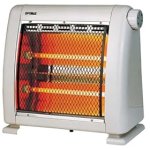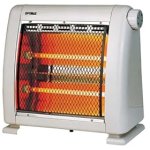eNORMous-
I don't have one of these, but will offer a few ideas:
1.) $300 for a small electric heater is at least $200 too much. A decent electric heater can be had for $100 or less, probably half as much, or $50.
2.) Watts is Watts, amperage is amperage, heat is heat. Whatever you put into a heater in amperage (amount of current flow) or watts (amount of power over time), comes out as heat, either as radiant energy and/or a rise in air temperature. All electrical energy is converted to one or the other of these forms of energy (or a combination of the two).
No heater can make more energy or heat out of a given amount of electricity than there is in what comes down the cord in amperage, voltage, and watts. Even the energy generated in the motor (if it has one) and heat lost in the cord of the appliance, turns of as some form of heat energy. These ideas are derivatives of fundamental laws of physics. Part of their advertising claims about this heater are simply not true. Read what I have written below, then re-read their ad!
3.) Heater history 101:
Early electric heaters simply had hot coils and radiated heat as infared heat wave energy.
Later, blower motors were added to help convert radiant and molecular energy of the hot coils to hot air, and blow this hot air around the room.
As time went on, two speed blowers with two heat level settings were developed, then thermostats were added for regulatory convenience. Some space heaters were also designed to oscillate back and forth to distribute the heated air better. Now we also have digital controls and timers.
Heaters can still be divided into radiant heaters and space (room) heaters, or a combination of the two.
Newer developments include:
Ceramic heating elements where the metal coils or elements are buried in a ceramic matrix (looks like a radiator heat exchanger) to lower the temperature of what were before exposed hot coils of wire. This lowers the fire danger by lowering the temperature of the heating element.
Quartz heating elements wrap the hot wire coils around a ceramic rod, then enclose that with a quartz glass tube. This makes a great radiant heater, and also provides protection from having a red-hot radiant heating coil in contact with the air. This lowers the fire potential., while still making a radiant type heater possible.
You can understand what a danger any hot heating element poses on a boat, particularly considering the possibility contact with gas, propane, or diesel fumes.
Space heaters are best suited to enclosed spaces, whereas...
Radiant heaters are better suited to open spaces where the entire space or room is too large to entirely heat up, thus the radiant heater can heat a workspace or sleeping space directly w/o wasting heat on the whole warehouse, etc.
Radiant heaters have the advantage of being able to heat up quickly and provide warmth without the lag of a space heater, which has to heat the entire space up gradually.
Again, remember that some heater types are actually combinations of these two types of heaters, providing both radiant heat directly and moving air to warm up space.
Now some more considerations.
Good heaters can be had for from $50-$100, and much less in the Springtime when stores close out their Winter seasonal merchandise.
The $100-$500 heater won't make any more heat than the $50 heater. The more expensive ones may circulate the air somewhat better, have more convenient controls, look prettier, etc., but you get the all the heat you pay for from the electric company, no more, no less.
I'd recommend you get a two speed / heat level heater with a low enough setting that you can run it on a generator conveniently. Also, a thermostatically controlled one makes a lot of sense when sleeping in a boat.
Heaters are designed with a maximum draw of about 1600-1700 watts total because they are usually plugged into a 15 amp circuit that can only provide 1800 watts without tripping the circuit breaker.
A Honda 2000i generator should be worked at no more than about 1600-1700 watts, which makes them able to handle most room heaters.
A Honda 1000i generator can be worked at 750 watts continuously, thus you need a heater that has a half-level setting within this range if you have this type of generator. If you have some other brand or level of generator, find out what level it can be worked at continuously and get an appropriate heater.
Another idea; I like a low lying heater, not a tall one. (Have dog or young child on board?) The flatter, more horizontal body is harder to accidently turn over in a boat than a tall one. All modern heaters have an automatic switch in them which will turn them off if they are turned some way other than upright. I'd find one that fits somewhere conveniently in a space once I have the boat set up for sleeping as well as when awake. Mine fits in the footwell under the helm, where it can be run during the day or at night. Also dries out wet feet, shoes, and socks!
Another thought: a 12 volt electric blanket can be a very viable alternative to staying warm when sleeping.
120 volt heaters must run off Shore Power or a generator. They can be run through a suitably large inverter, but the battery power needed is too great for most boat battery systems. Witness:
A 750 Watt heater will draw 6.25 amps at 120 volts. At 12 volts, the inverter must draw 62.5 amps to provide that 750 Watts, plus some more for its own inefficiency/heat loss. An 110 Amp-hour group 27 battery can provide that ~70 amp draw for less than 1/2 hour w/o damaging the battery, so battery power for these types of heaters is impractical.
So, in short, I think you may have a good heater there, but it's well over priced and a good part of the selling points are not scientifically valid.
Sorry for the lecture. Old Physics and Chemistry teachers have a hard time finding a suitable target audience sometimes!
P.S.: Too bad there isn't room for an electric simulated fireplace in a boat!
An alternative might be the
Dickinson Propane Fireplace:, although it's even more expensive and some folks won't like the propane heat source because of the perceived danger, etc.
Happy Thanksgiving!
Joe. :teeth :thup




